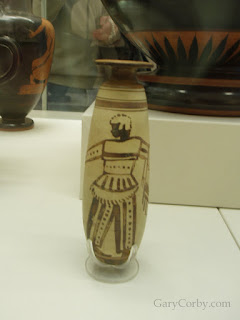To the Greeks, if you came from Africa, then you were either an Egyptian, or an Aethiopian. Aethiopian was their catch-all term for an African.
You might be surprised to hear there were Africans in the Greek lands. Here's an example:

I'm afraid it's not very clear from my poor photography, but this exhibit from the British Museum shows a boy, almost certainly a slave, holding a boot, and the features are African. (The funny shape at his back is a bird). The odds are very good this boy was passed along in the slave markets until he found himself working in Athens.
For some reason I don't understand, the Aethiopians had been an enemy of Hellas stretching back to the Trojan War. The bards sang in the great epic Aethiopis that Memnon, the hero-king of Aethiopia, brought a contingent to fight for the Trojans. Memnon slew Antilochus and was such a warrior that no one could touch him until he was brought down by Achilles himself. Memnon's skill and courage was so great that Zeus granted him immortality. The Greeks had no problem with someone of dark skin being beloved of the Gods and a hero.
Unfortunately Aethiopis has been lost, but it's part of the Trojan cycle and if we had it, it would almost certainly put some of the Iliad in a different light.
More recently, Herodotus recorded that a band of Aethiopians fought for the Great King of Persia when he invaded Hellas. Here's a good example of that:

This is an Aethiopian warrior in the army of Xerxes. You can tell because he's wearing trousers, very much Persian dress. The vase is dated 460-440BC, twenty or so years after the invasion.

7 comments:
Yeah ... you tend to see things someone's way when they can order you killed if you say "no." Good practice, that.
These historical background posts are always a good read, by the way. I like finding out things about the Classical Mediterranean that I might not otherwise know.
I'm a big fan of your historical posts too, Gary. They're always enlightening so keep it up!
Thanks for the encouragement! I started this blog as the overflow outlet for research which can't make it into the books. The other stuff only appears because the outlet's there.
So as long as I'm writing, I'll continue to pontificate on obscure ancient history. I confess I'm flattered people find this interesting.
Given that human beings are human, and have been for a long time, I find it difficult to believe Greek society was entirely color-blind. Just about every culture experiences some of that. We may not have it recorded as such, that's all.
How can we be sure based on the limited texts we have that there wasn't some kind of prejudicial stratification of people based on skin color? And is it possible that the basis of some of the "neighbors killing neighbors" might have been that some neighbors looked different?
Hi Jane, you're right of course that absence of evidence cannot be taken for evidence of absence, but it remains the case that as far as I know there is zero evidence for prejudice by skin color in the classical world.
The classical world did of course have slavery, and lots of it, but this can't be equated with racism since they didn't care what color your skin was, and many societies were perfectly happy to enslave their own people and ethnically identical neighbors.
Social stratification based on skin color is not known anywhere in the classical world. I think the historical record is probably complete enough that we can say it either didn't exist, or if it did, was a pathologically small sample far from the norm.
The caste system was probably being invented in India around this time and that probably counts, but India is a long way from the Mediterranean and is not normally considered part of the western classical heritage.
Tribalism however is very evident. The major conflicts in the Greek world are split between the Dorian and Ionian super-tribes. But these tribes are genetically identical. Similarly the Greeks and Persians had a tendency to kill each other, but this was clearly geopolitics; individuals married across the cultures and a number of high profile Greeks medized.
It's worth noting, too, that slavery in the classical world was a totally different animal to what it was in more modern times. Slaves could be honored teachers just as easily as they could be made to lick your boots. Slavery in Classical Greece was more similar to an indentured servitude than it was slavery as we know it in America--even taking into account the more Draconian tendencies of cultural law.
I hope you don't mind my contribution, Mr. Corby. Your blog is full of fascinating anecdotes, and it's great to see Classical history getting some of the glow from the spotlight in fiction!
Good point Amalia. Hellene slavery was, for the most part, more like enforced employment.
I have to point out that a slave consigned to the silver mines would have a very different (and short lived) opinion, but they were a small minority. The slave of a welathy man could live better than a poor citizen.
Thanks so much for contributing. The more the merrier!
Post a Comment